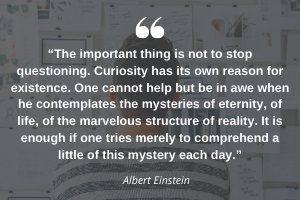Insight Science: The Next Frontier

Although many hours were spent after school lounging on an olive-green shag rug watching Star Trek with my brother, I am not a Trekkie. Spock, with his elf-like ears, produced data and facts like modern business intelligence machines do today. Captain Kirk processed the data, facts, and information from the crew to build strategies for defense, attack, and survival, depending on the episode’s adventure.
“Sometimes a feeling is all humans have to go on.”
– Captain Kirk
He had a way to merge data with his experiences, his intelligence, and the emotions of the situation to see into the gaps, understand risks, and look beyond what was right in front of him. He was the television portrayal of insight.
Sarah DaVanzo recently published Insights About Insights, a study informing us how current business environments are leading to a new field called Insight Science, or “the systematic study of insights and insighting to codify knowledge, through data-gathering experiments and exploration for the collective advancement of the insights field.”1 Sarah is a futurist whose international career has spanned innovation, marketing, trends and culture, insights, and foresight. I had the pleasure of being interviewed by Sarah for this study and wanted to share some highlights with you.
Given Toffler Associates’ recent client work focused on technology horizon scanning and Alternative Futures® Scenario Planning for innovation, I found this study to be particularly relevant.
How is your team structured and rewarded to promote insightfulness?
“Insightfulness begets insight.”
In the study, insight is defined as “Seeing what is hidden and not obvious or easily perceived and understood. Insight is understanding inner workings and underlying dynamics.”3
In the right environment, with a team that nurtures insightfulness, more will emerge. Like creativity, gratefulness, and mindfulness, the more you practice, the more natural it becomes.
How are you building and contributing to a more cognitively diverse and unbiased team?
“Diversity fuels insightfulness.”
We have different life experiences that we bring into the workplace. Those experiences, in turn, influence our thinking. When Toffler Associates conducts research, we are intentional about tracking the diversity (geographical, age/generational, educational, gender, race, etc.) to mitigate biases in the findings and identify assumptions and blind spots. Low cognitive diversity makes insights susceptible to bias.
How do leaders cultivate curiosity in the team and find balance with productivity?

According to the study, the most important trait contributing to insight is curiosity. 70% of respondents believe curious people are more insightful. This finding may not be a surprise to all, but it is a trait I often see lacking in organizations. Teams are so focused on getting work done, they have no space to ask questions or think about why or what they are doing. The act of doing creates focus and productivity, but it also distracts from creativity and curiosity. There is a time for both and depending on the role, job, or mission, the balance may be defined differently.
How will leaders learn from younger talent?
“Culture is the space between the dots.”
Many industrialized organizations are structured to execute processes and have not embraced the Third Wave (the post-industrialized society sometimes referred to as the information age).
Hierarchy and politics stimulate biases and assumptions which prevent the natural process of being curious which is to ask questions and then ask more questions.
As DaVanzo explains, “It appears that head-games kill insight discovery. But, given the Pareto Curve, if these head-games are addressed insight discovery can be improved by 60%.”6
Looking ahead to the future workforce and leaders, digital natives are entering the workplace, and they expect a more agile environment and structure. They have been reared to question everything. As a leader, this may feel like it is slowing the process, but it may also stimulate the curiosity of the team if there is space for it. Digital natives may also be more likely to believe that data and a digitized world adequately reflect the messy, analog world we live in which makes them less likely to tap into instinct, gut feelings, wisdom, or experience (or, worse, discount those things).
“The internal factors that contribute to discovering insights fall into two categories: mindsets and skillsets.”
There is reason to be optimistic – our leaders can learn and influence an organization’s ability to be more insightful – “65% of respondents believe insightfulness is a learned, teachable skill” and “43% believe insight comes from those who are engaged.”8
Cultivating a climate of openness, where any and all questions are encouraged is required. Not all leaders will embrace this because it is not what they experienced. Or, they might not value the questions of others. For the leaders who make a daily effort to model the behavior and engage the team in this way, they will see the results of greater insight emerge. In the words of Captain Kirk:
“There’s no such thing as the unknown, only things temporarily hidden.”
Toffler Associates helps organizations drive curiosity and understand the unknowns by prompting imaginations and bringing foresight expertise into innovation and strategic exercises. Although the unknown may be stressful, asking questions, conducting tabletop exercises, and exploring what we don’t know will surface what is temporarily hidden.
1-9Sarah Davanzo. “Insights About Insight.” 2020.


 About the Authors
About the Authors